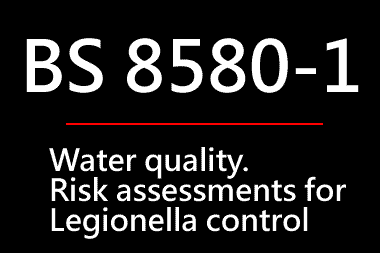Updated BS 8580-1:2019 for Legionella Risk Assessments

The main British Standard dealing with legionella risk assessments has recently been updated and is now called BS 8580-1:2019. It acts as a code of practice and provides recommendations and guidance on the assessment of the risk of Legionnaires’ disease from man-made water systems. The standard, originally published in 2010 has been updated to align it with the Health and Safety Executives ACOP L8 and other guidance documents such as HSG 274.
British Standards
British Standards are regarded as the most important codes of practice across numerous British industries. They safeguard quality and safety standards and are often updated to reflect changes in how standards are (or should be) managed, measured and controlled.
The original British Standard relating to water quality and legionella risk assessment was marked as BS 8580. It covered the process for assessing legionella risk factors and came out in 2010. The document was produced to assist those responsible for either ordering or performing risk assessments relating to the control of Legionella bacteria in the workplace.
What has prompted the BS 8580-1:2019 update?
The Health and Safety Executive (HSE) continually revises and improves its advice to businesses and other individuals concerned with maintaining good health and safety at work and in other situations. The HSE had already produced a document (ACOP L8) which detailed its own guidance on practices required to maintain safe water systems and ensure the levels of Legionella bacteria in water systems were kept at safe levels.
Changes to the ACOP L8 document were published in 2013 (Fourth Edition) together with supporting health and safety guidance in the form of HSG274. The guidance in HSG274 was split into three areas to provide easier access to the most pertinent information. Cooling towers were dealt with in part one, hot and cold water systems in part two, and other types of water sources and risk systems in part three.
The new standard is labelled as BS 8580–1:2019 to reflect the changes
Two areas are of specific interest in the 2019 update. Firstly, it highlights the need for those dealing with legionella risk assessments to be suitably competent and able to handle them correctly. It also highlights the need for clear reporting that provides all pertinent details without any unnecessary information. This is aimed at making the reports more user-friendly and easier to review later, if required.
Further changes have been made to annexed information within the British Standard 8580-1. This has been done to provide greater clarity when considering the information within. More detail has also been added in certain cases too, therefore providing an easier read and more in-depth information.
Anyone who wishes to follow the British Standard for Legionella risk management and assessment should now consult the updated BS 8580-1:2019 to learn more.
Pseudomonas control and BS 8580-2?
It is also very likely that a further update will be provided on the control of Pseudomonas in the future. It is thought this document will be titled BS 8580-2.
Standards for legionella risk assessments
If someone such as the appointed Responsible Person, who is in charge of ensuring water systems are safe in a building wants to follow the recommended path for maintaining water safety, the updated 8580 British Standard for Legionella risk assessment forms an excellent supporting code of practice document.
Legionella risk assessment and water safety specialists
Our teams of legionella and water safety specialists support those responsible for the control of waterborne pathogens in man-made water systems helping them to protect their people, customers and others. We deliver professional risk assessments, water testing, independent compliance auditing, City & Guilds training and other environmental risk management services that help keep people safe.
If you have questions about any of the issues raised above or you would like to speak with one of our legionella specialists please call us today on 0330 223 36 87 or contact us here.


